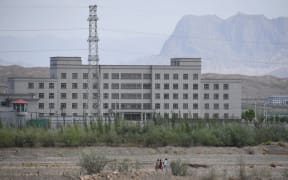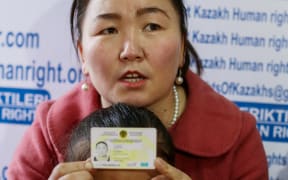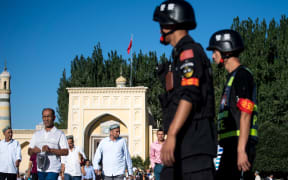If Parliament were to declare the treatment of Uyghur Muslims as genocide it would "no doubt" hurt New Zealand's trade relationship with China, the Trade Minister says.
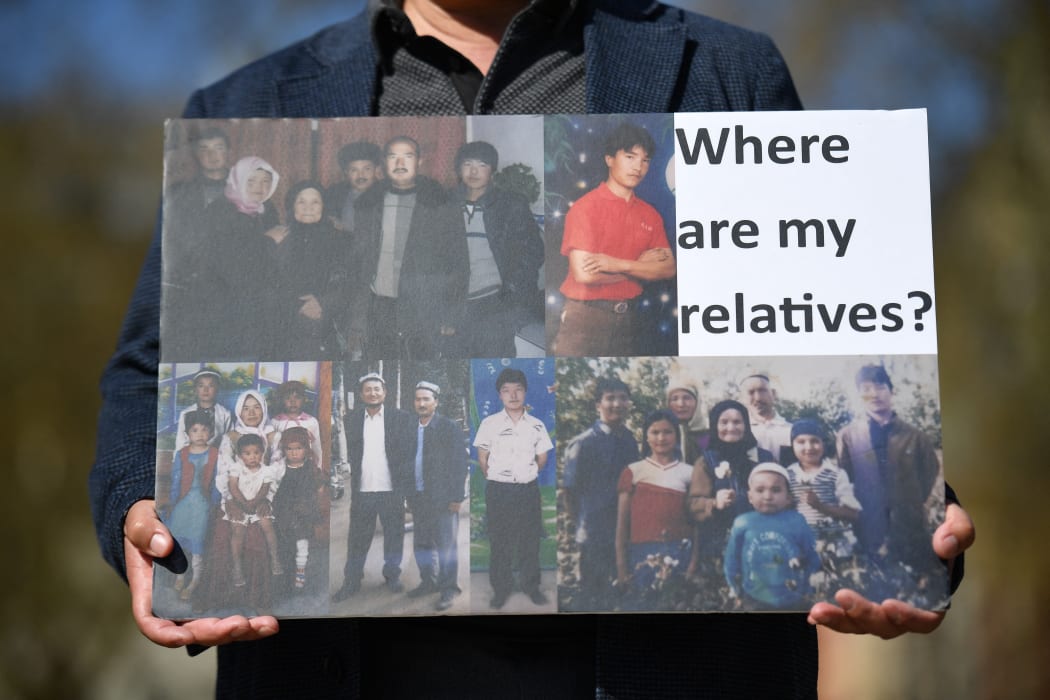
A member of the Uyghur community holds a placard as he joins a demonstration to call on the British parliament to vote to recognise alleged persecution of the Uyghur people as genocide and crimes against humanity in London on April 22, 2021. Photo: AFP / Justin Tallis
China has been under international pressure over its treatment of Uyghurs, an ethnic minority native to an area in China's northwest, which the UK and US have declared a genocide.
The ACT Party intends to put a motion to Parliament tomorrow to debate the treatment of the Muslims.
ACT deputy leader Brooke van Velden said many of the recent reports from Xinjiang amount to genocide.
Labour and National will discuss their position on the motion at caucus meetings today.
Trade Minister Damien O'Connor said the Chinese government "clearly" would not like it if Parliament declared the treatment as genocide.
When asked by reporters what that would do to New Zealand's trade relationship with China, O'Connor said "no doubt it would have an impact. That's hardly rocket science."
He would not say if he would advise the Labour caucus to dismiss the motion, instead saying "I'm sure there will be some interesting discussion on that".
Prime Minister Jacinda Ardern said the Labour caucus would discuss what could be done to support "the international community to build evidence around that next step".
She said the caucus did not want to "undermine" New Zealand's current position, which she described as "very strong".
When asked if she thought the treatment of Uyghur Muslims in Xinjiang amounted to genocide, Ardern pointed to the international law that guides the use of the word.
During yesterday's post-Cabinet briefing, Ardern said there was a set legal definition for use of the word, and highlighted three occasions where New Zealand has previously used it: Nazi Germany, Rwanda and Cambodia.
"In order to meet the international test, often that has required the ability of that verifiable additional international information.
"One of the reasons why New Zealand has repeatedly called for unfettered access ... to the region in order to assess potential human rights abuses for the Uyghur people. That is not to say that there isn't credible evidence of human rights abuses already, there is. For issues around genocide, that is one of the things you usually see precede the use of that definition. Those are some of the factors we'll be thinking about as we consider that motion."
During the China Business Summit yesterday, Ardern made it clear there was plenty New Zealand disagreed with, and would not let the economic relationship stop it from taking an independent stance.
The government in March released a joint statement with Australia that expressed both countries' "grave concerns about the growing number of credible reports of severe human rights abuses against ethnic Uyghurs and other Muslim minorities in Xinjiang."
"There is clear evidence of severe human rights abuses that include restrictions on freedom of religion, mass surveillance, large-scale extra-judicial detentions, as well as forced labour and forced birth control, including sterilization," the statement said.
National Party leader Judith Collins would not say if she thought the treatment was genocide, but said the government should release all of the information it had to MPs to allow them to decide.
Trade was the elephant in the room when matters like this were discussed, Collins said.
"We have said for a long time that we should learn always from the past and what the past should have taught us is that we should never have all of our eggs in one basket."
China's ambassador to New Zealand Wu Xi yesterday acknowledged the long-standing relationship between the countries, but issued a direct warning against "interfering" in "internal matters", specifically citing Hong Kong and Xinjiang.
The ambassador dismissed talk of forced labour and genocide as "lies fabricated" by anti-China forces.
Uyghurs in New Zealand plea for genocide declaration from MPs
A group of Uyghurs now living in New Zealand are asking MPs to back a formal declaration that China's treatment of Uyghur Muslims is genocide.
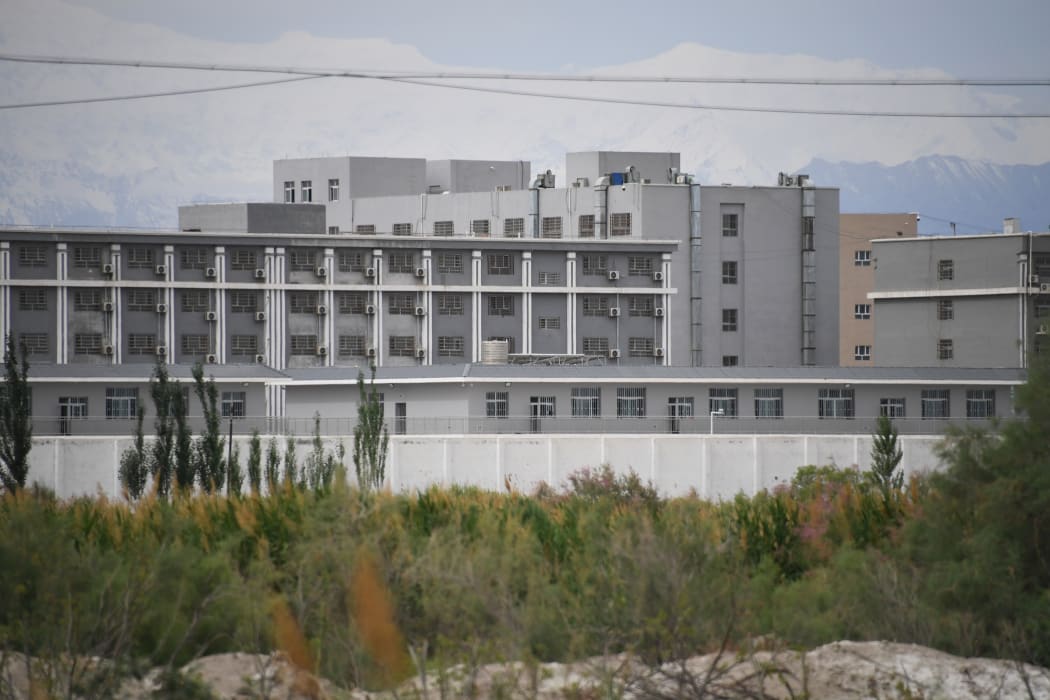
A facility believed to be a re-education camp where mostly Muslim ethnic minorities are detained, north of Akto in China's northwestern Xinjiang region pictured on June 4, 2019. Photo: AFP
High Court lawyer Sam Vincent, who is a spokesperson for the New Zealand-based Uyghurs, told Morning Report they were terrified of speaking up.
"They're terrified of publicly speaking up here in Aotearoa about what is happening. They often face intimidation by the Chinese Communist Party here."
Vincent claims one New Zealander was on a video call with his family there six years ago when he saw authorities detaining his brother and hitting his mother at their home.
"There has been a lot of take-up of that call here [for it to be denounced as genocide] in Aotearoa and of course overseas. There is momentum behind it and I think it's growing. We really do need Parliament and New Zealand's voice [added] to the growing chorus in the international community."
While Vincent was not confident of getting the motion passed, he said evidence showed it was clear that a genocide was taking place.
"There was an independent report produced ... by a thinktank in the US called the Newsline Institute, which looked at that publicly available evidence and they applied the international law to it. They concluded that there is a genocide taking place."
He said the New Zealand government's stance had not been strong enough so far against China.
"I think our politicians are reasonably aware of what is going on. They're not afraid to denounce what is happening but we need them to go to steps further, say that what is happening is genocide ... and I think that has to be a foundation for real action and more than just words.
"[Action] is what has been totally lacking so far. We need stop Uyghur labour-forced products from reaching our shores, we need to apply sanctions to Chinese officials complicit in the genocide and create a legislative framework for that, and we also need to create a pathway for Uyghur refugees who have escaped China to resettle safely here."

